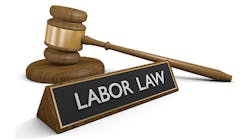Trump’s NLRB Nominations Could Deliver a New Era in Labor Regulation for 3PLs
Employer groups cheered when President Trump nominated two new Republican members to the National Labor Relations Board (NLRB), and who are expected to reverse Obama-era pro-union policies, including many that directly impact the logistics industry.
Once confirmed by the Senate, nominees Marvin E. Kaplan and William J. Emanuel would join the current Republican Chairman Philip A. Miscimarra to form a majority on the five-member board, leaving Democrat members Mark Gaston Pearce and Lauren McFerran in the minority.
Kaplan currently serves as chief counsel to the Occupational Safety and Health Review Commission, an independent agency that hears appeals of citations imposed by the Occupational Safety and Health Administration (OSHA). He was previously a Republican staffer on the House Oversight and Government Reform Committee, and House Education and the Workforce Committee.
Emanuel is a Los Angeles-based labor relations attorney with the firm of Littler Mendelson who has represented employers and industry associations before both the NLRB and state courts.
Employer groups had urged Trump to move more quickly on these nominations. “It is long past time that these vacancies on the NLRB are filled,” notes Mark Mix, president of the National Right to Work Committee. “The Senate should quickly confirm these qualified nominees.”
“We are thrilled to see Marvin and William nominated to the NLRB. A full and complete NLRB has been one of the top priorities for companies that are grappling with the misguided decisions of the previous board,” says Evan Armstrong, vice president of government affairs for the Retail Industry Leaders Association.
David French, senior vice president for government relations for the National Retail Federation, comments, “Over the past eight years, the retail industry and employers across the country have faced a crushing regulatory burden that has created immense uncertainty in labor relations and made it much harder to grow. Much of this uncertainty has stemmed from the NLRB’s pursuit of an activist agenda that consistently put the interests of labor unions before the rights of employers and employees. Both job creators and employees will benefit from a more balanced approach in labor relations.”
This fall Trump also will be able to nominate a new general counsel for the NLRB, replacing Democrat and former union attorney Richard F. Griffin, Jr. This is especially important because the general counsel is approved by the Senate and serves a five-year term, as do the commissioners. He also functions as a gatekeeper—the board members make policy only by deciding appeals of individual cases at the regional level that he chooses for them to hear.
Policies Ripe for Reversal
Miscimarra wrote earlier this spring that after the Senate approves two more Republican members, the new majority would seek to reverse the NLRB’s controversial micro-unit decision.
This policy, adopted by the board in 2011, allows unions to organize subsets of workers who make up only a small part of a larger workforce in the same workplace. Called micro-units, they have been a boon for unions who used the decision to invade workplaces where they would be much less likely to be welcomed by a majority of a facility’s workers.
Miscimarra predicted that this policy will be reversed in his dissent to a May 10 decision handed down by the current Democrat majority. In that case the board denied an employer’s request for NLRB to review a unit that consisted only of workers in an in-plant warehouse that was a small portion of a larger manufacturing facility.
Making an NLRB reversal of this policy more important was the U.S. Supreme Court’s refusal to hear another micro-unit case, which essentially leaves the micro-unit policy in place until the board changes it. That case involved a union organizing the fragrance and cosmetic saleswomen at a Macy’s department store where the union earlier had lost a vote among all of the store’s salespeople.
Legislation has been introduced in Congress to overturn the micro-unit policy as well as the NLRB’s “quickie” election rule, which allows unions to press forward with organizing votes faster than they could in the past, before employers can mount effective campaigns among their workers to counter union propaganda.
More problematic is the requirement that the employer must provide a detailed employee list to the union—within two days. The alphabetized list must include the full names, work locations, shifts, job classifications and contact information (including home addresses, available personal e-mail addresses, and available home and personal cell telephone numbers) of all eligible voters.
Invariably, this list will end up containing at least a few errors or come in later than the two days mandated. The current NLRB has used these technical errors to reverse votes by employees to reject unions and to order another vote take place.
The Obama-era board has made a host of other decisions that employers hope the new NLRB will reverse, including establishment of joint liability for staffing firms and their corporate clients, and reaching into nonunion workplaces to penalize employers over the content of employee handbooks, and disciplining employee outbursts on Facebook and Twitter.




